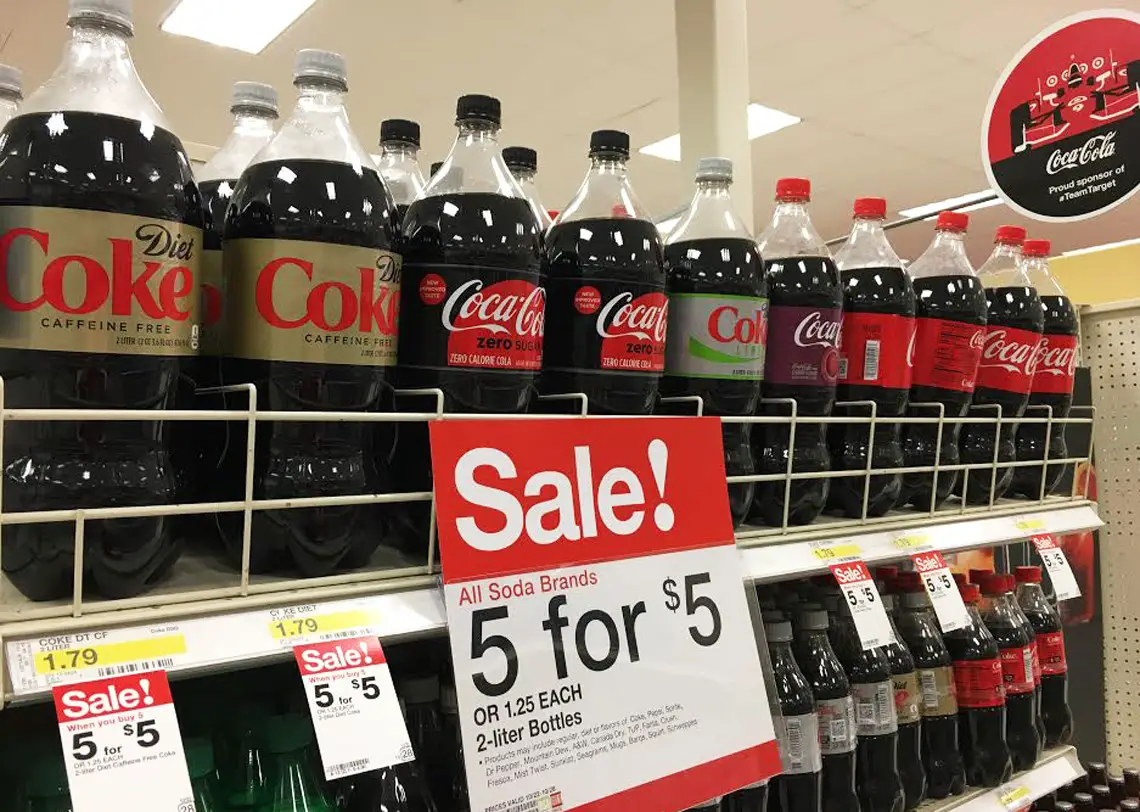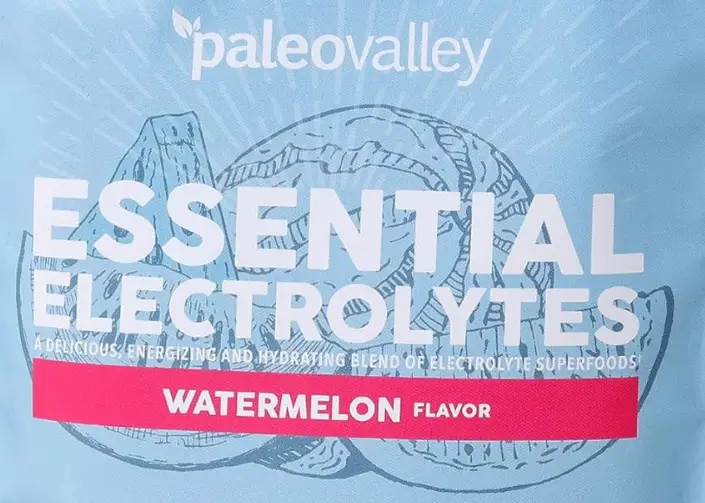
Photo via TheKrazyCouponLady.com
Drinking soda, be it Coca-Cola, Pepsi, Dr. Pepper or others, is a daily ritual for over half of Americans. The majority of these consumers have an understanding of how bad these sugary drinks are, yet due to an addiction to sugar or artificial sweeteners — a real epidemic — most are too stubborn to give it up.
Yet, many are rightfully concerned, and their main concern is sugar: a whopping 33 grams of sugar in a can of coke, or almost three tablespoons.
Since research has long linked these sugary drinks to obesity, Type 2 diabetes, fatty liver disease, and even cardiovascular problems (and did you know that the majority of sweetness comes from high-fructose corn syrup, a GMO product?), many people have decided to leave these drinks behind.
The unsettling findings drove huge numbers of consumers — approximately 2 out of 5 soda drinkers — to switch to what they mistakenly thought to be a healthier alternative: diet soda.
This switch soon raised a question: Is there anything worse than sugar?
Very likely. And if you were skeptical about diet soda’s claims of being “healthier,” you were absolutely right.
Diet soda is sweetened with zero-calorie, sugar-free sweeteners, and as recent research reveals, it might be worse than sugar after all.
2017 Study Links Diet Soda to Stroke and Dementia
Stroke journal published a study in spring 2017 that found a link between drinking diet soda and increased risk of stroke and dementia. Daily drinkers of this beverage are almost three times more likely to develop stroke and dementia.
This included a higher risk of ischemic stroke, where blood vessels in the brain become obstructed and Alzheimer’s Disease dementia, the most common form of dementia,” said the lead author of the study, Matthew Pase of Boston University.
Those who drink one or more diet drinks a day are 2.96 times more likely to experience an ischemic stroke and 2.89 times more likely to be diagnosed with dementia (Alzheimer’s disease).
Diet drinks “might not be a healthy alternative,” the study, undertaken on 2,888 participants over the age of 45 from the community based Framingham Heart Study, concluded. The Heart Study is a project of Boston University and the National Heart, Lung and Blood Institute.
So far, scientists have not been able to verify exactly how artificial sweeteners in diet drinks contribute to the risk of stroke, but the risk is evident. Aspartame, sucralose, and others have all been linked to major health problems.
The study authors still believe that diet soda is slightly better than the regular kind, because of regular soda’s link to obesity and related health problems, although both can cause serious health problems over time.
***
The best way to get your fizzy drink fix without drinking aspartame laced sodas?
Drink more Electrolytes!!!
These are the best-tasting and healthiest electrolytes I have EVER had in my entire life…
Try ‘Essential Electrolytes’ On Sale Now From Paleo Valley
(Click Here to Try Them, Today Only [On Sale Now])
What do Alzheimer’s, Dementia, ADHD, Autism, Depression, Anxiety, and Brain Fog have in common? Find out NOW, watch “The Broken Brain” docu-series for FREE.
Zero-Sugar versus Sugary Drinks: Obesity Risk Remains
Sucralose is an artificial sweetener made from regular sugar that goes through a chemical manufacturing process that results in a product that is 600 times sweeter than sugar.
It used in Diet Pepsi, as well as some apple juices, ice cream bars, candy, eggnog, gum, protein bars, iced coffee, kettle corn, mints, salad dressing, and dozens of other processed foods and products (see full list).
All of these product makers and their customers bought into the marketing that this sweetener is somehow better than sugar. But it may be even worse for your health.
In 2013, a study published in Trends in Endocrinology & Metabolism found that it, just like sugar, is linked to Type 2 diabetes, obesity, metabolic syndrome, and heart disease.
The researchers of this study concluded that regular sugar in moderation in still a better choice than artificial sweeteners.
Besides the same issues with obesity and other conditions, sucralose is also ridden with other problems:
- Sucralose kills good gut bacteria, disrupting GI tract function. Lower numbers of good bacteria are linked to obesity and weight gain.
- Prevents absorption of medications: if you are taking pharmaceutical medication, sucralose may be the reason why it is not working.
- Releases toxins: sucralose (sold under the Splenda brand name) decomposes during processing (especially cooking and baking), which makes it release the toxic compounds chloroproanols. These chemicals have been linked to increased cancer risk.
- Alter body’s normal function: when studied on rats, sucralose was found to change insulin and blood sugar levels.
- It has been associated with inflammatory bowel disorder.
- Sucralose has even been linked to altered genes, particularly triggering pro-inflammatory genes.
- Diet soda has been associated with kidney problems.
- Drinking diet soda increases the risk of metabolic syndrome by 34%, which can lead to high cholesterol and heart disease.
- Diet soda is a risk for dental health and with a pH level of 3.2 (pH of water is 7, and the human body needs to be close to 7.4 to be healthy); diet soda literally rots teeth.
Because of all of the above, the Center for Science in the Public Interest put Splenda (sucralose) on a list of artificial sweeteners to avoid, together with aspartame.
It is good to avoid all sucralose-containing products too, like diet soda.
Aspartame Not Any Better For Health
While sucralose flies beneath the radar, aspartame has been widely condemned in the holistic health community.
That’s because there have been many warnings sounded about the potentially devastating effects of this highly unnatural artificial sweetener on the body and brain.
According to one activist named Mark Gold, individual complaints on aspartame included 49 different symptoms, including headaches, severe depression, grand mal seizures, and confusion/memory loss.
It has also been reported that as high as 75 percent of all adverse reactions reported to the FDA are aspartame-related, including nausea, dizziness, weight gain, breathing difficulties, heart palpitations, memory loss and more.
Another study from the University of Iowa analyzed nearly 60,000 women and found that those drinking two or more diet sodas were 30 percent more likely to have a cardiovascular event and 50 percent more likely to die from related disease.
Aspartame has been diet soda’s main ingredient for years years and is still used in Diet Coke, but Pepsi switched to sucralose recently due to consumer health concerns, and then brought aspartame back as part of their “classic sweetener blend.”
At any rate, research like the Iowa study and the sheer number of side effect reports to the FDA makes it clear that aspartame is capable of causing serious health problems.
While the substance continues to be approved by government health officials and some dispute the studies showing evidence of harm, many people have removed it from their diet and noticed major improvements.
Should You Drink Diet or Regular Soda?
In reality, both versions of soft drinks are best avoided completely: diet and regular (daily consumption is the worst). Besides too much sugar and artificial sweeteners, most sugary drinks are also made with GMO ingredients and contain controversial, toxic preservatives.
And if you are using a sweetener to make drinks in your own kitchen, try using fruit juice or honey, or if choosing sugar in moderation — organic coconut sugar is a unique, healthier alternative.
Thumbnail photo via Jezebel.com.
Read Next: More on Hydration and Health
Drinking This Type of Water Can Exacerbate Common Health Problems
Further Reading:
From Three a Day to Zero in Three Years: How I Dropped Diet Pop (eBook)
Thanks for installing the Bottom of every post plugin by Corey Salzano. Contact me if you need custom WordPress plugins or website design.






